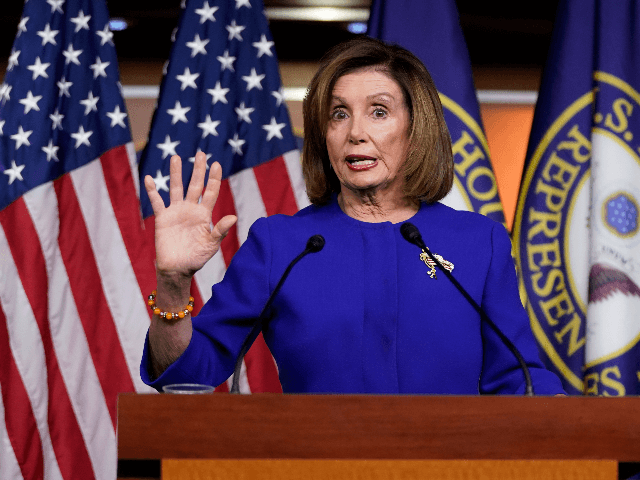The House’s vote on a War Powers Resolution on Thursday to restrict the president’s ability to take military actions with regard to Iran does nothing of the sort.
Instead, it is a purely political vote that has no actual legal or legislative teeth behind it, and will never make it to the president’s desk even if the U.S. Senate also passes it because of the way House Democrat leadership under Speaker Nancy Pelosi structured the resolution.
The resolution, which Pelosi selected Rep. Elissa Slotkin (D-MI) to lead, is structured as what is called a “concurrent resolution” in the House or Senate.
By definition, a “concurrent resolution” is “generally employed to address the sentiments of both chambers, to deal with issues or matters affecting both houses, such as a concurrent budget resolution, or to create a temporary joint committee.”
“Concurrent resolutions are not submitted to the president and thus do not have the force of law,” the official definition continues.
In other words, the resolution as drafted by Slotkin, pushed by Pelosi, and which will probably pass the House of Representatives late Thursday afternoon does not have the force of law even if both Chambers of Congress pass it, because it will never be sent to the president for his signature either adopting it or vetoing it.
Matt Fuller from the Huffington Post described the effort as more like the House of Representatives adopting a “press release”:
Mark Bednar, a spokesman for House GOP leader Rep. Kevin McCarthy (R-CA), said this is purely a “show vote.”
“House Democrats would rather take a show vote for their socialist base than stand against the world’s largest state sponsor of terror,” Bednar said in an email.
Pelosi, asked about the lack of teeth behind a concurrent resolution which does not have the force of law but is merely a statement of sentiment by a Chamber of Congress, said at a press conference on Thursday morning that she thinks it does have “real teeth.” Pelosi said:
If you are familiar with the War Powers Act, and I’ll get you the text, the War Powers Act enables two approaches to go forward—one is a Concurrent Resolution, and it gives the procedure for that which we will be following today and it gives the path for an H. Con resolution. We’re taking this path because it does not require a signature by the president of the United States.
Then, Pelosi let slip that this is not seriously meant to restrain Trump on Iran. “This is a statement by the Congress of the United States,” Pelosi continued. “I will not have that statement diminished by whether the president will veto it or not.”
This question over whether this effort is genuine or political is particularly poignant given the fact that Congress did just last year pass and send to the president an actual War Powers Resolution with teeth that forced President Trump to veto it. That bipartisan effort to rein in the administration’s backing of the Saudi Arabian coalition in Yemen’s civil war, led in part by Rep. Ro Khanna (D-CA), garnered widespread support in both chambers of Congress and the president did not publicly weigh in for some time—a sign that he was seriously deliberating signing it. Trump ended up vetoing it.
Several Freedom Caucus members voted for the measure back then on principle, because it was a principled fight actually meant to try to end a war. In the Senate, it also had broad bipartisan support, from Sens. Rand Paul (R-KY) and Mike Lee (R-UT) backing it to Sens. Bernie Sanders (I-VT) and Chris Murphy (D-CT) also supporting it.
The effort made it to the president, who did eventually veto it, but nonetheless it forced an official response from the president on this matter and made great progress for the movement to end endless wars.
Paul, in an exclusive interview with Breitbart News at the time, called it’s passing an “extraordinary moment.”
Khanna, a Democrat and the co-chairman of Sanders’ presidential campaign, called for bipartisan coalitions to end endless wars in his own Breitbart News exclusive.
Per a House GOP leadership aide, the question now becomes: If Pelosi were serious about War Powers when it comes to Iran, why not undertake an effort similar to one that could eventually force Trump’s hand in some way, like the Yemen War Powers Resolution did? Part of why Democrats are afraid to do this, the aide said, is because of the likelihood that Republicans would be able to successfully attach what’s called a “motion to recommit” to the effort should Pelosi do it the real way. The GOP has used this tactic—and did so even on the original Khanna War Powers push on Yemen—to great effect to undermine the core messaging of the House Democrat leadership. In fact, on the Khanna one, Republicans successfully attached a “motion to recommit” attacking antisemitism that excoriated Reps. Ilhan Omar (D-MN) and Rashida Tlaib (D-MI) for their antisemitic history–even though Omar voted for it, as it passed unanimously.
So, per this House GOP leadership aide who says that Democrat leadership have been overheard discussing their worries about a “motion to recommit” fight on this, Pelosi and her team have opted to go the toothless political statement route rather than a real legal binding resolution that forces the president’s hand route.
That also raises the question about whether the effort to politicize the War Powers process undoes much of the progress those opposed to endless wars made in the last couple years, or if it does actually send a message to President Trump and the executive branch as a whole.

COMMENTS
Please let us know if you're having issues with commenting.